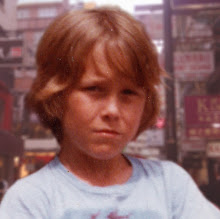Hey! You know how most of our slang comes from advertising? No? Correct! Nothing's squarer than an advertising executive trying to be cool, or - God help us - define coolness. Although they would dearly love to be the arbiters of cool, advertising can never be that. This perfectly innocent ad for Arrow ties is trying to get us to adopt some British slang from a previous century. Nice try.
If Arrow is to be believed, "wizard" and "pip-pip" mean "great" or "terrific". This is the first I'd ever heard of "wizard" being used as an adjective and "pip-pip", in my experience, has always been what an embarrassing Yankee says when he or she is trying to pull off a British accent of Dick Van Dyke-caliber, and failing to do so with a Dick Van Dyke level of cringeworthy lameness. Van Dyke was a perectly serviceable actor, but a vocal chameleon, he was not. To perform your own Dick Van Dyke-style British accent, just talk with a golf ball in your mouth.
I could find no evidence that "pip-pip" means "good". My actual paper copy of British English A to Zed has this to say about "pip" (and has no entry at all for "pip pip"... possibly because no British person ever actually used the phrase with sincerity.).
This makes sense with the dfinition I found at EffingPost.com: "Pip pip - Another out-dated expression meaning goodbye. Not used any more." The beeps or "pips" heard during a telephone call may have come to be used as a greeting or "goodbye". But this is my own conjecture based on some bits of information I found out, and should not be interpreted as historical fact.
I have heard "pip" used to describe a person, usually in cockney slang, as seen here at Merriam-Webster: "one extraordinary of its kind."
As for "wizard". This one seems like crazy talk. A quick Google search shows that it was used in the early scenes of the movie Juno:
FLASHBACK - Juno approaches a boy hidden by shadow. He's
sitting in an overstuffed chair. She slowly, clumsily lowers
herself onto his lap.
A 60's Brazilian track plays from a vintage record player.
WHISPERED VOICE Do you know how long I've wanted
this?
JUNO Yeah.
WHISPERED VOICE Wizard.
I found this prehistoric blorg post from 2007, where Melora Koepke was predicting that soon all The Kids would be using "wizard" instead of "cool".
be warned, "Wizard!" may well be everywhere, soon. Move over, Napoleon Dynamite imitators: Juno is about to transform the teenage idiom once and for all!
Yep! Nope. It didn't. I enjoyed the snappy dialogue in Juno, but I forgot the "wizard" thing. First I've heard of it. What's my copy of British English A to Zed got to say about "wizard"?
Hm! I guess it does mean what Arrow says it means. It's just not sweeping the nation like Melora Koepke thought. "Wizard" has had its chance to become a thing since World War One-ish, and it just hasn't happened. However, it does show you how deep Diablo Cody dug for improbably kooky things for her characters to say when writing the script for Juno. Honest to blog.
Much to the chagrin of Advertising, I'm sure, you know where a lot of our slang and euphemism comes from? The Bible, Shakespeare, and the military. A LOT of the entries in my British English book cite military as the source of unconventional Briticisms. You can find that interesting all you want, but I wouldn't go so far as to thank Hitler.
 |
| Click for big. |














4 comments:
As an Englishman I can tell you that 'wizard' definitely means 'super' or 'smashing', but 'pip-pip' is usually heard as a farewell, as in 'cheerio, pip-pip and all that rot, what?'
Well holy smokes. I thought stuff like "cheerio, pip-pip and all that rot, what" was only in cartoons... you know, like Dick Van Dyke? Thanks for the definitive straight dope, Jeff!
[-Mgmt.]
When it's REALLY supercalifragilisticexpialidocious, it's spelt "Wizzard," as in Roy Wood.
Pip-Pip, by the way, was the original central character in Charles Dicken's "Great Expectations," until an editor, suspecting the reading public might be a bit squeamish about conjoined twins, surgically excised "-Pip."
Post a Comment